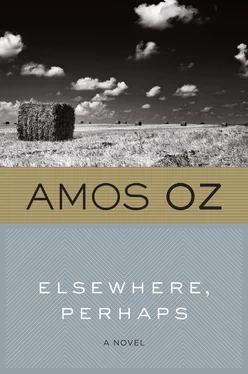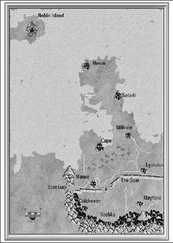Fruma Rominov is a thin, wrinkled woman. She holds herself very erect. Her nose is narrow and pointed like a bird's beak, her hair is faded to an indeterminate color, her eyes are blue. Her eyes are blue, but sometimes, when a gloating look comes into them, they take on a vague, murky color. She is slightly built, and her movements are sharp and lively. Her mouth is different. It frequently has an offended air, and its corners twitch tearfully. Her movements, as we have said, are sharp and lively, and they fill you with nervous apprehension. As if you have something to fear.
In the old days Alter Rominov's cheerful laugh moderated his wife's bitterness. Alter Rominov was a tiny man, like his wife. It was amazing that from such loins should have sprung a strapping, well-built pair of sons. The boys did not inherit their father's cramped, European-Jewish appearance. Apart from the horsy jaws, none of Alter Rominov's features was reproduced in his two sons. For obvious reasons they hebraized their surname from Rominov to Rimon.
We loved their father for his unbounded kindness. He was always in a good mood. Always trying to be funny. There was nothing sharp about his humor; his jokes, like their author, were mild, pale, and inoffensive. The kind of jokes that win a man neither admirers nor enemies. He was the principal butt of his own humor. "Don't give me a gun when I'm on night watch," he said. "A man like me can frighten robbers away unarmed." We understood him and felt a gentle sympathy for him. His name was omitted from the rota of night watchmen.
The physical work ruined Alter Rominov. Most of the founder-members of the kibbutz adapted and acclimatized themselves to the rigors of the life. The work and the climate brought out a dormant strength in such characters as Reuven Harish and Ezra Berger, and, of course, Grisha Isarov — each in his own way. But Alter Rominov grew weaker and weaker and looked more shriveled every summer. He used to wander around the camp, battered and exhausted, trying to hide his weakness with poor jokes.
"You can see that I'm 100 per cent European," he used to say. "You've become completely Asiatic, but I'm a European through and through. The hamsin finishes me off. What I need is white ducks and a topee."
And when you slapped him heartily on the back and asked how he was, he would answer:
"I feel like a rabbinical student pressed into the Czar's service, ha ha ha."
He was miserable, and there was always a look of shy puzzlement in his eyes, which could be quite endearing. But he also had a stubborn pride. It was his pride that made him resist his wife's attempts to persuade him to leave the kibbutz and live like a civilized human being. He listened to everything else she said, but not to this. To his sons he used to say:
"The land of Israel ought to be the opposite of the ghetto. If we want to make a ghetto, it would have been better to stay in Europe. At least there there was no hamsin. "
And it was during a hamsin that he collapsed and died. Not like his son Yoash and not like his friend Aaron Ramigolski, but like a ghetto Jew. In his last years he had been working in the laundry, but one morning he was asked to go and help Israel Tsitron in the banana plantation. Alter put on a curious hat and said:
"For the sake of the nation, let's try irrigation!"
He worked the irrigation pipes for three or four hours. When the sun began to beat down on his head, he vomited. He was told to sit down and rest. He gave one of his shy smiles and said:
"Death among the hose pipes."
Ten minutes later he vomited again, flopped down, and said:
"I'm so hot."
Israel Tsitron went off to fetch him some water. When he came back, Rominov was sitting with his back against the trunk of a gigantic banana tree, as if he were resting; but he was dead. Fruma contends that we killed him. We deny the charge gently and try to change the subject. Reuven Harish wrote a poem in his memory, which was published in our news sheet.
Two years later Yoash Rimon fell in the Suez campaign. He was commanding a parachute squadron. The two successive disasters did not break Fruma's spirit. She revealed great resources of strength. It must be counted to our credit that we do not judge Fruma with our accustomed severity. What a pity that she, for her part, judges our actions with redoubled severity. Fruma Rominov volunteered to run the kindergarten, which she does with intelligence and authority. The children love her because she does not practice favoritism and because she always tells them the truth, even the kind of truth that is not normally told to small children. The parents respect her. On the education committee she is outstanding for her consistent and uncompromising stands. On several issues she has saved us from adopting the easy way out. At one of the meetings she said:
"I am opposed to certain aspects of the kibbutz ideology. But since they exist, they must be upheld. Hypocrisy is no solution. It's very easy to pretend, but one pretence leads to another. That's life. And therefore…"
Such words naturally engrave themselves on one's memory.
***
Fruma Rominov gathers up her baking equipment and her cakes, covers the whole trayload with a white cloth, and steps briskly out of the kitchen, asking Einav on the way whether she can do anything to help her. Einav thanks her and says she can manage by herself. Fruma tells Einav that she is a wonderful girl and goes out into the night. The night stoops over her and blows vague scents in her face.
The night stoops over you and blows its scents at you.
An unpleasant, sour smell wafts from the hen house. A dense vapor from the cowshed, a damp smell from the stores. Various odors drift from all sides. A wild smell from the fields. The riotous air of the mountains provides a lively accompaniment. The cascades of mingled odors excite the furious barking of the dogs, which gives way to distracted and terrifying howls.
The moon is still in hiding. Your eyes seek its pale radiance and find only the stars, conversing in a bluish Sicker. The mighty, moonless sky is indifferent alike to you and to the silent, encircling foe.
Our village is encircled. Outside the fence something stirs. If only you could interpret the signs. A snarling menace surrounds the fence trying to penetrate and disrupt our tidy order. Base treason whispers already on the outskirts of the camp. Mute objects mutiny first. In the panting darkness they slowly change their shape. Take on other forms. You look at them, and they seem alien; their angles soften and curve. You look at the trusty bench half hidden, as always, among the flowering shrubs, and you find all its lines altered. You sharpen your gaze and try to put down the treachery, and it intensifies with a snicker. There are no lines to be seen. Only shapes, unconnected shapes, black within black wrapped in black. You fix your eyes on a pleasant arbor, but they seem to detect a cautious movement. Look up at the mighty sky. There, at least, things are as they were. But no. Even above you something is happening. From the top of the water tower a bluish light hits you with a terrifying wink. A spasm has seized dumb objects. They are rebeling against good order. Even the searchlight beam quivers apprehensively. Unruly shadows respond with a riotous dance.
Now the crickets. The crickets exchange secret messages. Into their concentration intrudes the distant throbbing of the refrigeration plant. The swishing sprinklers intrigue against you and join the side of the crickets. The crickets are learning your secrets and signaling your fears to their listening friends out in the hostile fields.
The mountains are invisible, but their presence broods over the valley. The mountains are there. Drunken gorges pouring down to attack us. Blocks of dark rock hanging high up as by a thread, threatening to sever their connection with the mountain. A hint of a movement, a patient, subdued murmur comes creeping. The mountains are there. In total silence, they are there. Standing like curved columns, like giants frozen in some obscene act and turned to stone, the mountains are there.
Читать дальше












